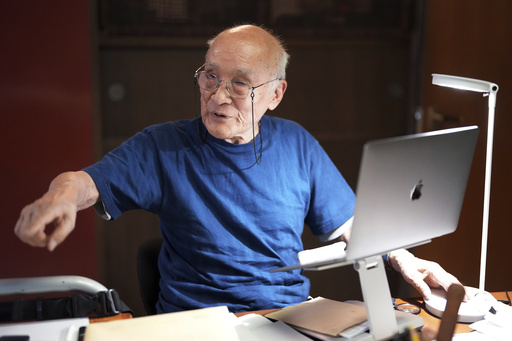Shuntaro Tanikawa, a revolutionary figure in contemporary Japanese poetry, passed away at the age of 92 on November 13, as confirmed by his son, Kensaku Tanikawa. His death, which occurred in a Tokyo hospital, was attributed to natural causes related to old age.
Tanikawa made a significant impact on the literary scene with his groundbreaking debut, “Two Billion Light Years of Solitude,” published in 1952. This work offered a bold perspective on the intersection of the cosmic and the everyday through sensual and vivid language that remained accessible. Interestingly, it predated Gabriel García Márquez’s renowned novel “One Hundred Years of Solitude,” yet quickly became a bestseller in its own right.
Among his notable works is “Kotoba Asobi Uta” or “Word Play Songs,” a playful exploration of sound and rhythm that juxtaposes words with similar sounds, showcasing a joyful use of language through alliteration and onomatopoeia. In a 2022 interview, Tanikawa expressed his deep connection to the Japanese language, likening it to a plant from which he drew sustenance to create art.
His poetry often delves into themes of the ordinary, finding beauty in mundane details. One such piece, titled “I wanted to talk to you in the kitchen in the middle of the night,” exemplifies his belief in writing freely without the constraints of commissioned work.
Not only did Tanikawa contribute to poetry, but he also wrote the script for the documentary film “Tokyo Olympiad,” which chronicled the 1964 Tokyo Games. His reverence for the intricacies of the Japanese language is apparent in everything he created. Moreover, he was recognized for translating works by notable authors such as Maurice Sendak and Mother Goose, leading to his own translations in various languages, including English and Chinese.
His writing extended into children’s literature, with several of his works adapted into picture books and included in Japanese school curricula. He cleverly integrated foreign words, exemplified by including “Coca-Cola” in his poetry.
According to the Poetry Foundation, Tanikawa’s poetry conveys a metaphysical perspective on life, articulated in simple yet profound language that captures emotional truths and ideas.
Born in 1931 to philosopher Tetsuzo Tanikawa, he began writing poetry in his teenage years, mingling with prominent poets like Shuji Terayama and Makoto Ooka. Initially viewing poetry as a divine revelation, he later recognized it as a part of the earthly experience, emerging from the cultural ground of Japan.
Though Tanikawa maintained a friendly and approachable demeanor, often engaging with audiences during readings, he lamented his decision to leave education unfinished as he reached fame early in life. This detachment from the somber academic poetry circles of postwar Japan possibly influenced his pioneering style, which ultimately reshaped the landscape of contemporary Japanese poetics.
In regards to death, Tanikawa articulated a sense of curiosity rather than fear, expressing a desire for a peaceful passing without prolonged suffering. He mused on the unknown that awaits beyond this life, captivated by the thought of a “different world.”
Tanikawa is survived by his son, musician Kensaku Tanikawa, daughter Shino, and several grandchildren. A private funeral was held, with plans for a memorial event to honor his legacy. Kensaku Tanikawa shared heartfelt sentiments about his father’s works, stating, “Shuntaro’s poems stunned and moved me, making me chuckle or shed a tear. Wasn’t it all so fun? His poems are with you forever.”
